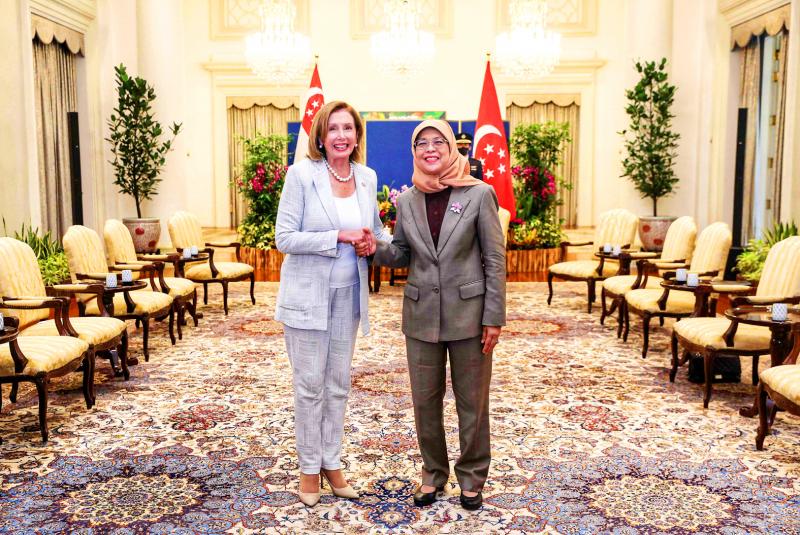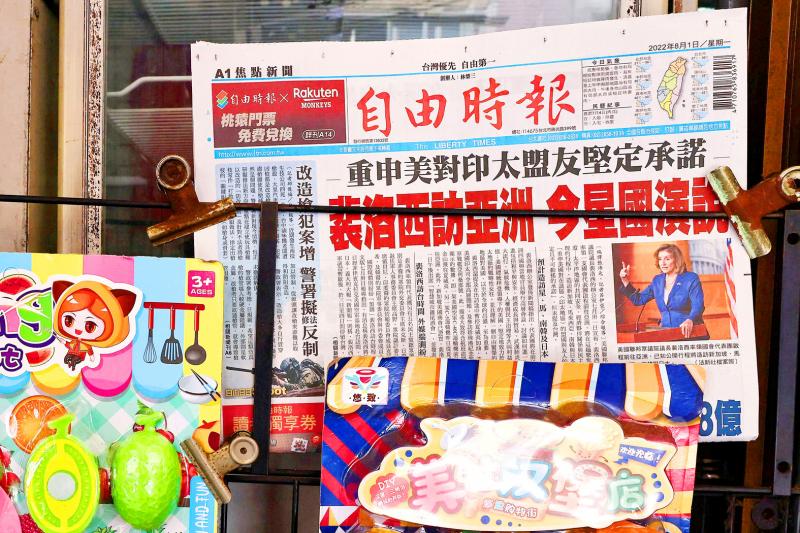If US House of Representatives Speaker Nancy Pelosi comes to Taiwan, she would likely arrive this evening or tomorrow morning after visiting Malaysia, a US analyst said yesterday.
According to the China Press, a Malaysian Chinese-language newspaper, she is to arrive in Kuala Lumpur today for her second stop.
Although the Malaysian government has not announced an official itinerary, the paper cited a person familiar with the plans as saying she would only stay for a few hours.

Photo: AFP / Singaporean Ministry of Communications and Information
Meanwhile, South Korean National Assembly Speaker Kim Jin-pyo’s office yesterday said he would meet with Pelosi on Thursday morning before holding a news conference and eating lunch together.
Based on Pelosi’s itinerary thus far, Josh Rogin, a political analyst for the Washington Post and CNN, on Twitter yesterday predicted that “the Taiwan stop would likely be after her Malaysia stop, meaning Tuesday night or Wednesday morning.”
Sources yesterday told the Chinese-language Liberty Times (sister paper of the Taipei Times) yesterday that the time of Pelosi’s arrival in Taiwan would be close to what others have speculated.

Photo: Ann Wang, Reuters
Arrangements are being made, including a public appearance with a visit to the Legislative Yuan tomorrow, they said, adding she would also meet with President Tsai Ing-wen (蔡英文).
However, given the sensitivity involved, plans would change according to situations, they added.
Meanwhile, local media quoted other sources as saying that Pelosi could possibly stay at the Grand Hyatt Taipei in Xinyi District (信義) or the Marriott Taipei in Zhongshan District (中山).
Asked about the potential visit, Premier Su Tseng-chang (蘇貞昌) did not confirm or deny the possibility, but said Taiwan welcomed all foreign guests and promised to make the best arrangements with respect to their itineraries.
Pelosi arrived in Singapore early yesterday for the first stop on her Asia tour.
Pelosi met with Singaporean Prime Minister Lee Hsien Loong (李顯龍), President Halimah Yacob and other Cabinet members, the Singaporean Ministry of Foreign Affairs said.
Lee welcomed a US commitment to strong engagement with the region and the two sides discussed ways to deepen US economic engagement through initiatives such as the Indo-Pacific Economic Framework, the ministry said in a statement.
Lee and Pelosi also discussed the war in Ukraine, tensions surrounding Taiwan and China, and climate change, it said.
Lee “highlighted the importance of stable US-China relations for regional peace and security,” it added, in an apparent allusion to reports that Pelosi could visit Taiwan.
In Beijing, Chinese Ministry of Foreign Affairs spokesman Zhao Lijian (趙立堅) reiterated earlier warnings, saying “there will be serious consequences if she insists on making the visit.”
He did not spell out any specific consequences.
“We are fully prepared for any eventuality,” he said. “The People’s Liberation Army will never sit by idly. China will take strong and resolute measures to safeguard its sovereignty and territorial integrity.”
Washington has tried to assure Beijing there is no reason to “come to blows” and that if such a visit occurred, it would signal no change in US policy.

DAREDEVIL: Honnold said it had always been a dream of his to climb Taipei 101, while a Netflix producer said the skyscraper was ‘a real icon of this country’ US climber Alex Honnold yesterday took on Taiwan’s tallest building, becoming the first person to scale Taipei 101 without a rope, harness or safety net. Hundreds of spectators gathered at the base of the 101-story skyscraper to watch Honnold, 40, embark on his daredevil feat, which was also broadcast live on Netflix. Dressed in a red T-shirt and yellow custom-made climbing shoes, Honnold swiftly moved up the southeast face of the glass and steel building. At one point, he stepped onto a platform midway up to wave down at fans and onlookers who were taking photos. People watching from inside

A Vietnamese migrant worker yesterday won NT$12 million (US$379,627) on a Lunar New Year scratch card in Kaohsiung as part of Taiwan Lottery Co’s (台灣彩券) “NT$12 Million Grand Fortune” (1200萬大吉利) game. The man was the first top-prize winner of the new game launched on Jan. 6 to mark the Lunar New Year. Three Vietnamese migrant workers visited a Taiwan Lottery shop on Xinyue Street in Kaohsiung’s Gangshan District (崗山), a store representative said. The player bought multiple tickets and, after winning nothing, held the final lottery ticket in one hand and rubbed the store’s statue of the Maitreya Buddha’s belly with the other,

‘NATO-PLUS’: ‘Our strategic partners in the Indo-Pacific are facing increasing aggression by the Chinese Communist Party,’ US Representative Rob Wittman said The US House of Representatives on Monday released its version of the Consolidated Appropriations Act, which includes US$1.15 billion to support security cooperation with Taiwan. The omnibus act, covering US$1.2 trillion of spending, allocates US$1 billion for the Taiwan Security Cooperation Initiative, as well as US$150 million for the replacement of defense articles and reimbursement of defense services provided to Taiwan. The fund allocations were based on the US National Defense Authorization Act for fiscal 2026 that was passed by the US Congress last month and authorized up to US$1 billion to the US Defense Security Cooperation Agency in support of the

HIGH-TECH DEAL: Chipmakers that expand in the US would be able to import up to 2.5 times their new capacity with no extra tariffs during an approved construction period Taiwan aims to build a “democratic” high-tech supply chain with the US and form a strategic artificial intelligence (AI) partnership under the new tariffs deal it sealed with Washington last week, Taipei’s top negotiator in the talks said yesterday. US President Donald Trump has pushed Taiwan, a major producer of semiconductors which runs a large trade surplus with the US, to invest more in the US, specifically in chips that power AI. Under the terms of the long-negotiated deal, chipmakers such as Taiwan Semiconductor Manufacturing Co (TSMC, 台積電) that expand US production would incur a lower tariff on semiconductors or related manufacturing